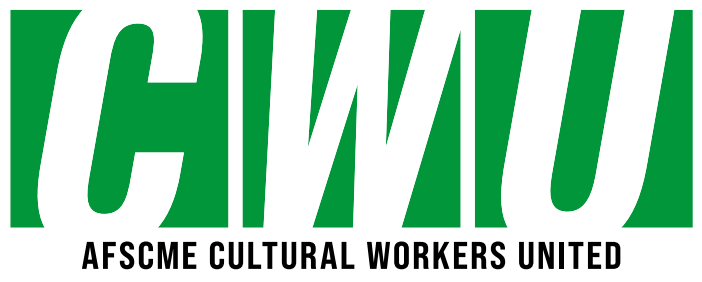Why join a union?
Being part of a union benefits our communities, our families and our professions. Without a guaranteed voice on the job, rules and quality standards vary – and employers often make decisions arbitrarily. By building a union with our co-workers, we can bring real and lasting change to our cultural institutions.
Union workers have on average 20% higher wages and benefits than their nonunion counterparts, according to U.S. Bureau of Labor Statistics. Your union can also protect you from unjust discipline or firing by creating a grievance procedure. Almost any problem in the workplace can be resolved more effectively and fairly when you have union representation.
Why are cultural professionals choosing to organize with AFSCME Cultural Workers United?
We represent 35,000 cultural workers across the country, more than any other union, including 10,000 museum workers at over 100 cultural institutions and 25,000 library workers at 275 libraries.
We built our national AFSCME Cultural Workers United campaign because we believe that all workers deserve a voice and dignity at work. We have the tools and resources to support our members to be effective advocates in their workplace.
What is AFSCME?
AFSCME is the American Federation of State, County, and Municipal Employees. With members in hundreds of different occupations, AFSCME advocates for fairness in the workplace, excellence in public services and prosperity and opportunity for all working families. Together, we advocate for fairness in the workplace, safety on the job, fair wages, good benefits, a secure retirement, and excellence in public services.
Who does AFSCME CWU represent?
AFSCME CWU is the largest union representing organized workers in the cultural job sector. In libraries, museums, zoos and other cultural institutions, we represent cultural workers in a variety of positions such as full-time and part-time curators, conservators, researchers, librarians, librarian assistants, archivists, preparators, HVAC technicians, visitor service associates, museum instructors, art handlers, sales associates, educators, museum researchers, artists, audio/visual employees, scientists, zookeepers, digital media specialists, data specialists, event specialists and more.
What kind of voice do we have in our union?
Unions are the most democratic institutions that workers have in this country. We vote to elect our stewards, bargaining team members and other leaders. Democracy and transparency ensure the accountability of financial and representational matters of our union.
What are the steps to forming a union?
There are several factors that could impact the organizing process. For example, local labor laws and whether the institution you work for is considered public or private will play a big role in how you and your co-workers can achieve union recognition.
Although the process to form a union varies, every campaign typically begins with these 3 steps:
- Speak to trusted co-workers to see if there is interest/support for a union in your workplace
- If there is interest, form an organizing committee that includes representatives from the majority of departments
- Contact us so a union organizer can help you research and strategize the most efficient way to win your union
How can my co-workers and I join AFSCME Cultural Workers United?
If you and your co-workers have already formed an organizing committee and are ready to win your union, contact us today!
Why do employers try to prevent workers from forming a union?
Employers fight back because they know that when we unite with our co-workers, we have the power to advocate for real changes in our workplace. When we win our union, they are required to collectively bargain with us over issues such as fair wages, improvements in safety and security and more. The benefits we win are then secured in a legally binding contract!
It is not uncommon for employers to resort to union-busting tactics to discourage us from building worker power in our institutions. Management may hire expensive anti-union consultants, hold mandatory meetings designed to misinform and scare employees, and engage in many other practices to divide us.
How does AFSCME advocate for political change?
Our industries are regulated by elected officials and public administrators. They determine how cultural institutions like libraries and museums operate in our communities and make decisions that affect our jobs and the work we do. That’s why AFSCME is active in the political arena. Just as community organizations, not-for-profit cultural organizations, and others lobby politicians to support their business, we need to reach out to politicians to support our professions. We have a voluntary political action fund called AFSCME PEOPLE, which helps us elect candidates who support cultural workers and hold those candidates accountable once they’re in office.
If I join the union, will I have to go on strike?
Strikes are the strongest tool we have, but also the last resort. We have many other tools to escalate pressure on the employer before striking. We will only go on strike if the majority of eligible workers/members vote to go on strike. The decision is ours.
How does collective bargaining work?
We choose a committee of our co-workers who sit down with our employer and negotiate an agreement. This agreement is known as a collective bargaining agreement (CBA) or a union contract. The committee sits at the table with the employer as equals and they negotiate to address the issues that we have prioritized as a group. The majority of union members must approve the agreement before it can be accepted as our contract.
